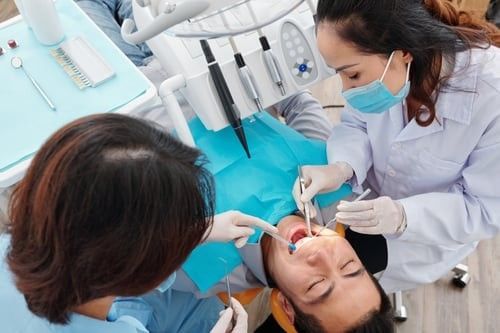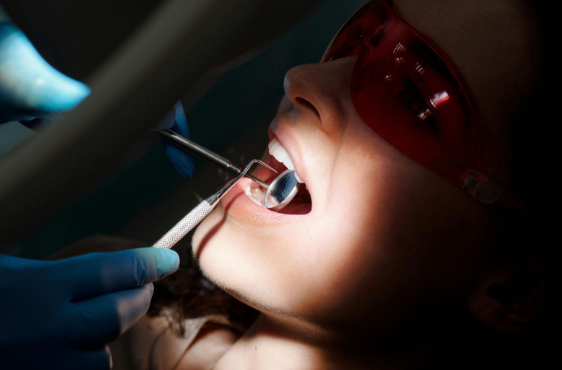Gateway Family Dental Blog
How Stress Affects Your Teeth and What You Can Do About It

Stress is a common part of life, but many people do not realize the impact it can have on their dental health. Chronic stress affects the body in various ways, including the teeth and gums. From jaw pain to gum disease, stress can lead to serious dental problems if not managed properly.
Let’s explore how stress affects your teeth and what steps you can take to protect your oral health.
Teeth Grinding and Clenching
A common impact of stress on dental health is teeth grinding, or bruxism. Many individuals unknowingly clench or grind their teeth while sleeping. This habit can wear down the enamel, cause tooth sensitivity, and even lead to fractures. Over time, excessive grinding can also result in jaw pain and temporomandibular joint (TMJ) disorders.
If left untreated, bruxism can cause severe tooth damage that may require restorative treatments such as crowns, veneers, or even extractions. Stress-induced grinding is particularly concerning for individuals who already have weakened enamel or pre-existing dental issues.
Increased Risk of Gum Disease
Stress weakens the immune system, making it harder for the body to fight infections, including those affecting the gums. High-stress levels can contribute to inflammation in the mouth, leading to gum disease. Symptoms include bleeding gums, swelling, and in severe cases, gum recession. If left untreated, it can result in tooth loss and other complications.
Studies have shown that individuals under chronic stress are more likely to develop periodontitis, a severe form of gum disease that affects the bones supporting the teeth. Stress-related inflammation can worsen existing gum conditions, leading to increased plaque buildup and bacterial growth.
Dry Mouth and Bad Breath
When the body is under stress, it produces less saliva. Saliva is necessary for washing away bacteria and food particles that can lead to cavities and bad breath. A dry mouth increases the risk of tooth decay and makes it easier for harmful bacteria to thrive.
Many stress-related habits, such as excessive caffeine intake and smoking, can further worsen dry mouth. Dehydration caused by stress can also exacerbate this condition. Keeping the mouth hydrated and reducing stress-related behaviors can help alleviate dry mouth and its associated issues.
Canker Sores and Mouth Ulcers
Many people experience mouth ulcers or canker sores during periods of high stress. These small, painful sores appear inside the mouth and can make eating and speaking uncomfortable. While they are not dangerous, frequent occurrences may indicate high-stress levels and require attention. Canker sores are often triggered by immune system imbalances, which are influenced by prolonged stress.
Some people may also develop stress-related habits such as biting their cheeks or lips, which can lead to further irritation and sores. Using mild mouth rinses and avoiding acidic or spicy foods can help speed up the healing process.
Poor Oral Hygiene Habits
People under stress often neglect their daily oral hygiene routines. Skipping brushing, flossing, or delaying dental visits can result in plaque buildup, cavities, and gum disease. Stress can also lead to unhealthy eating habits, such as consuming sugary or acidic foods, which can harm the teeth. Emotional eating or drinking excessive alcohol during stressful times can significantly impact oral health.
Also, stress may cause reduced motivation for self-care, causing individuals to forget important dental hygiene practices. Over time, these habits can lead to severe dental problems that require professional intervention.
What You Can Do to Protect Your Teeth
Finding healthy ways to manage stress can improve both mental and dental health. Exercise, meditation, and spending time outdoors can help reduce stress. Here are other ways that can help:
Manage Teeth Grinding
A night guard can prevent damage caused by teeth grinding, as these custom-made devices create a barrier between the upper and lower teeth, reducing pressure and protecting the enamel. Relaxation techniques, such as deep breathing or meditation, can also help reduce clenching during the day. Practicing jaw exercises and gentle massage can relieve tension in the jaw muscles.
Seeking help from a dentist for a proper diagnosis and treatment plan is essential. In some cases, stress management therapies, such as cognitive behavioral therapy (CBT), can also help reduce unconscious teeth grinding.
Maintain Good Oral Hygiene
Brushing twice a day with fluoride toothpaste and flossing daily are essential for maintaining oral health. Regular dental check-ups allow for early detection of stress-related dental problems. Staying hydrated can also help prevent dry mouth and keep bacteria under control. Using mouthwashes that contain moisturizing agents can help alleviate dry mouth symptoms.
If stress is causing lapses in oral hygiene, setting reminders or keeping dental care items easily accessible can encourage consistency in maintaining oral health.
Eat a Balanced Diet
Consuming foods rich in vitamins and minerals, such as calcium and vitamin C, can support oral health. Avoiding excessive sugar and acidic foods can help prevent cavities and enamel erosion. Eating fiber-rich fruits and vegetables can naturally clean the teeth and stimulate saliva production.
Incorporating probiotics into the diet can help balance oral bacteria, reducing the risk of gum disease. Drinking plenty of water and limiting processed foods can further support overall dental health.
Schedule your appointment with our team at
Gateway Family Dentistry today and take the first step toward a healthier, stress-free smile. We provide personalized care and help you protect your teeth from the effects of stress.




